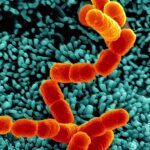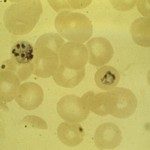Link to Pubmed [PMID] – 31413195
Link to DOI – 10.1073/pnas.1900266116
2019 08; 116(35): 17498-17508
Transmission of Plasmodium falciparum involves a complex process that starts with the ingestion of gametocytes by female Anopheles mosquitoes during a blood meal. Activation of gametocytes in the mosquito midgut triggers “rounding up” followed by egress of both male and female gametes. Egress requires secretion of a perforin-like protein, PfPLP2, from intracellular vesicles to the periphery, which leads to destabilization of peripheral membranes. Male gametes also develop flagella, which assist in binding female gametes for fertilization. This process of gametogenesis, which is key to malaria transmission, involves extensive membrane remodeling as well as vesicular discharge. Phospholipase A2 enzymes (PLA2) are known to mediate membrane remodeling and vesicle secretion in diverse organisms. Here, we show that a P. falciparum patatin-like phospholipase (PfPATPL1) with PLA2 activity plays a key role in gametogenesis. Conditional deletion of the gene encoding PfPATPL1 does not affect P. falciparum blood stage growth or gametocyte development but reduces efficiency of rounding up, egress, and exflagellation of gametocytes following activation. Interestingly, deletion of the PfPATPL1 gene inhibits secretion of PfPLP2, reducing the efficiency of gamete egress. Deletion of PfPATPL1 also reduces the efficiency of oocyst formation in mosquitoes. These studies demonstrate that PfPATPL1 plays a role in gametogenesis, thereby identifying PLA2 phospholipases such as PfPATPL1 as potential targets for the development of drugs to block malaria transmission.








